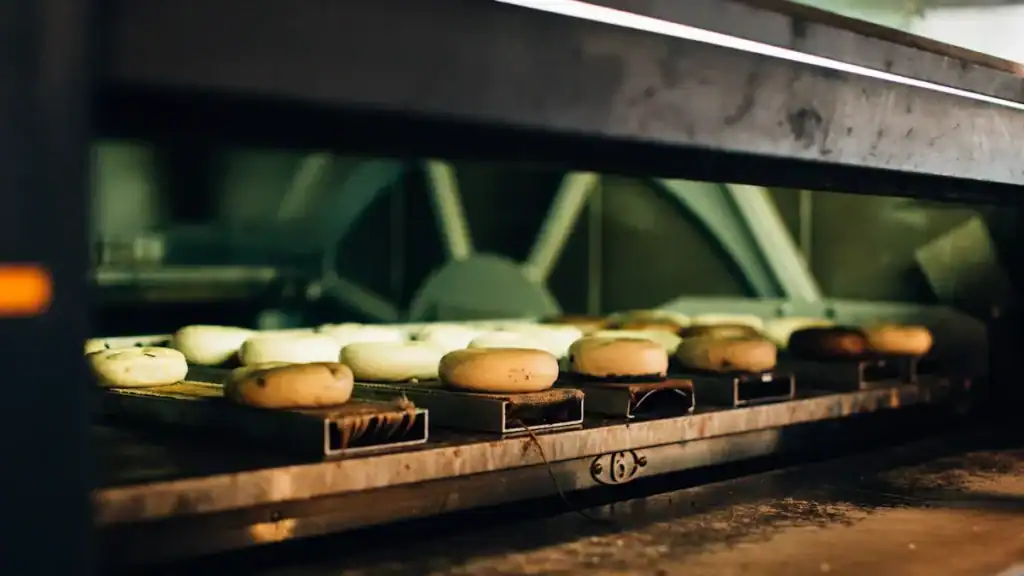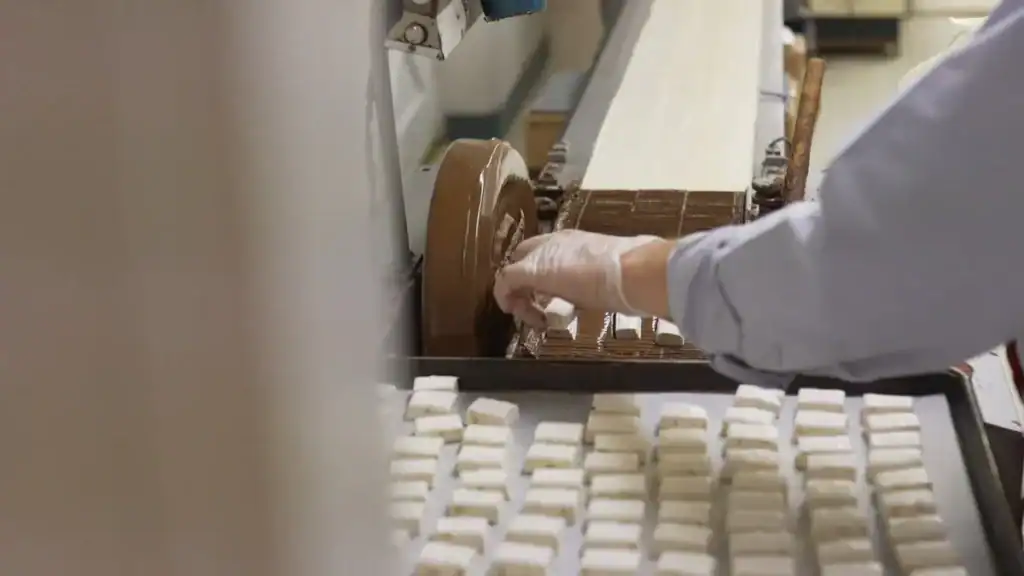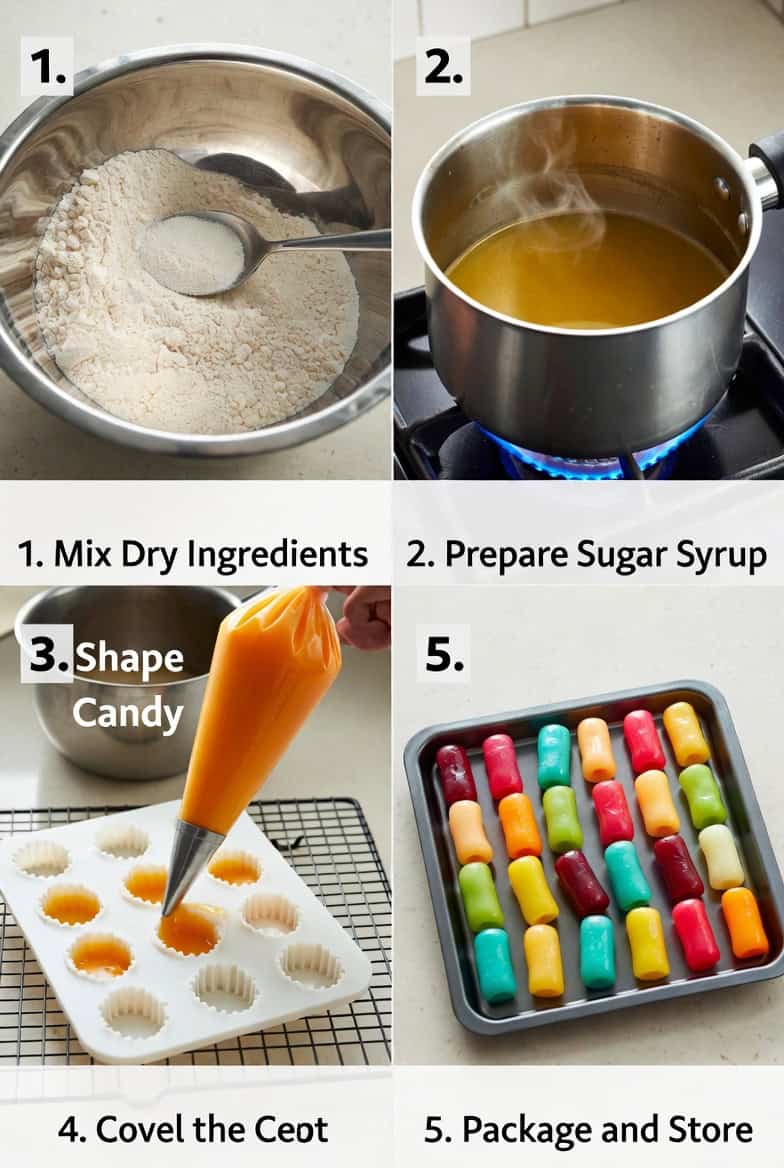Introduction aux lignes de production
Une ligne de production de biscuits est un dispositif de fabrication qui permet de produire des biscuits à grande échelle, en garantissant une qualité de produit constante et en réduisant les déchets. Une ligne de production de biscuits automatique prend en charge toutes les étapes de la fabrication des biscuits avec une intervention humaine minimale, offrant ainsi une grande efficacité et une production régulière.
La ligne de production comprend des étapes telles que le mélange, le façonnage, la cuisson et l'emballage, en utilisant une ligne complète qui intègre tous les équipements nécessaires tels qu'un four de cuisson, une bande transporteuse et un système d'alimentation, et est largement utilisée dans l'industrie alimentaire.
Lignes de production de biscuits peuvent être personnalisées pour produire des biscuits tendres ou durs, et s'adaptent à différentes formes en changeant de moule. Les machines automatisent presque toutes les étapes du processus de fabrication, du mélange de la pâte à l'emballage, ce qui réduit considérablement le travail manuel et améliore l'efficacité opérationnelle.
Une technologie de pointe, comprenant des pétrins verticaux et horizontaux, des moules rotatifs, des fours tunnels, ainsi que la bande transporteuse et le système d'alimentation, est utilisée dans les domaines suivants lignes de production de biscuits pour assurer un transfert en douceur de la pâte à biscuits à chaque étape.
La ligne de production de biscuits se compose d'une machine à former les biscuits qui fonctionne avec une pâte à biscuits correctement mélangée, d'un pétrin et d'autres composants clés pour assurer une production efficace de biscuits.
Principaux fabricants
- Principaux fabricants de lignes de production de biscuits, conçues spécifiquement pour répondre aux divers besoins de production.
- Ces fabricants fournissent lignes complètes de production de biscuits, Les lignes de production de biscuits tendres et les lignes de production de biscuits durs, la ligne de production de biscuits durs étant une offre spécialisée.
- Ils offrent également un service après-vente et des garanties, assurant ainsi la satisfaction du client et un fonctionnement fiable. Ces fabricants prennent en charge la production à grande échelle et la production de masse pour les clients industriels.
- Les principaux fabricants ont une expérience éprouvée dans l'industrie de la biscuiterie et proposent des solutions innovantes pour répondre aux besoins de la production. Des techniciens professionnels assurent l'installation, la formation et la maintenance.
- Leurs lignes de production de biscuits sont conçues pour réduire les coûts de main-d'œuvre et minimiser les erreurs humaines, ce qui se traduit par une rentabilité et des produits de haute qualité. Les fabricants proposent souvent à la vente une ligne de production adaptée aux différentes tailles d'entreprises, et certaines lignes peuvent également être adaptées à la production de crackers.
Machine à former les biscuits
- Une machine à former les biscuits, ou machine à biscuits, est un élément clé d'une usine de fabrication de biscuits. chaîne de production de biscuits, Il est chargé de donner à la pâte la forme souhaitée.
- La machine peut produire différents types de biscuits, y compris des biscuits à pâte molle et des biscuits durs, et la machine à biscuits automatise le processus de façonnage.
- Il est conçu pour fonctionner efficacement avec d'autres composants, tels que le pétrin et le four tunnel, ainsi que le coupeur rotatif et le moule rotatif pour façonner la pâte en différentes formes, afin de garantir une qualité de produit constante. Le couteau rotatif est utilisé pour couper avec précision la pâte façonnée, tandis que le moule rotatif est essentiel pour former des biscuits moelleux.
- La fiabilité de la machine à former les biscuits dépend de la robustesse de ses composants, notamment du réservoir sous pression pour le contrôle de la température et de la pression, et sa qualité peut affecter l'efficacité globale de la production.
- Les machines avancées de formage de biscuits utilisent des systèmes automatisés pour réduire le travail manuel et améliorer la capacité de production.
Biscuits à pâte molle
- Les biscuits à pâte molle et les biscuits moelleux sont un type de biscuit populaire qui peut être produit à l'aide d'une pâte molle. chaîne de production de biscuits.
- Le processus de production comprend le mélange, la mise en forme et la cuisson de la pâte pour créer un biscuit tendre et délicieux.
- Les biscuits à pâte molle nécessitent des paramètres de cuisson et un contrôle de la température spécifiques pour garantir une texture et un goût adéquats.
- La ligne de production de biscuits à pâte molle est conçue pour traiter la pâte délicate et produire des produits de haute qualité.
- La ligne de production peut être personnalisée pour produire divers types de biscuits à pâte molle, y compris des biscuits sandwiches.
Mélangeur de pâte
- Le pétrin est un élément clé d'une machine à pain. chaîne de production de biscuits, Il est responsable du mélange des ingrédients et de la formation de la pâte.
- Le pétrin peut être un pétrin vertical ou un pétrin horizontal, en fonction des exigences de production.
- Le pétrin est conçu pour fonctionner efficacement avec d'autres composants, tels que la machine à former les biscuits et le four tunnel, afin de garantir une qualité de produit constante.
- Les pétrins avancés utilisent des systèmes automatisés pour réduire le travail manuel et améliorer la capacité de production.
- La qualité du pétrin peut affecter l'efficacité globale de la production et la qualité du produit.
Spécifications techniques
- Les spécifications techniques d'un chaîne de production de biscuits La capacité de production, le contrôle de la température, les paramètres de cuisson et l'inclusion d'un convoyeur de refroidissement pour la stabilisation post-cuisson sont autant d'éléments à prendre en compte.
- La ligne est conçue pour produire des biscuits de haute qualité avec une texture et un goût constants.
- Les spécifications techniques peuvent varier en fonction du type de biscuits produits, tels que les biscuits à pâte molle ou les biscuits à pâte dure.
- La ligne de production peut être personnalisée pour répondre à des exigences de production et à des spécifications techniques spécifiques.
- Les spécifications techniques sont un élément essentiel du processus de production des biscuits, et leur exactitude peut affecter la qualité globale du produit.
Contrôle et assurance de la qualité
Le contrôle et l'assurance de la qualité sont essentiels au succès de toute ligne de production de biscuits. Biscuit de tête Les fabricants de lignes de production de biscuits mettent en œuvre des systèmes complets de contrôle de la qualité à chaque étape du processus de production, depuis la sélection des matières premières jusqu'à l'emballage final des biscuits. En intégrant des technologies de pointe et des systèmes d'inspection automatisés, les fabricants peuvent surveiller de près le mélange de la pâte, le formage des biscuits et la cuisson, garantissant ainsi que chaque lot répond à des normes strictes en matière de goût, de texture et d'apparence. Ces systèmes automatisés permettent de minimiser les erreurs humaines et de maintenir une qualité de produit constante, ce qui est essentiel pour renforcer la confiance des clients et la réputation de la marque. Grâce à des protocoles d'assurance qualité rigoureux, les fabricants peuvent fournir des biscuits de haute qualité qui satisfont constamment les demandes du marché.
Formation et assistance aux opérateurs
Les performances et la fiabilité d'une ligne de production de biscuits dépendent fortement de l'expertise de ses opérateurs. Des programmes complets de formation des opérateurs sont essentiels, car ils permettent au personnel d'acquérir les connaissances nécessaires pour exploiter, entretenir et dépanner efficacement la ligne de production. Des opérateurs bien formés peuvent maximiser l'efficacité de la production, maintenir une qualité de produit constante et réduire la probabilité d'erreurs coûteuses ou de temps d'arrêt. Outre la formation initiale, l'assistance continue du fabricant de la ligne de production de biscuits, comme l'accès à des manuels d'utilisation détaillés, à des ressources en ligne et à un service clientèle réactif, permet aux opérateurs de rester confiants et compétents. Cet investissement dans la formation et l'assistance permet non seulement de réduire les coûts de main-d'œuvre et les erreurs humaines, mais aussi d'optimiser l'ensemble du processus de production de biscuits.
Entretien et réparation
L'entretien régulier et les réparations opportunes sont essentiels pour maintenir les performances et la longévité d'une ligne de production de biscuits. L'établissement d'un programme d'entretien régulier - comprenant le nettoyage, la lubrification et des inspections approfondies - permet de prévenir l'usure des équipements et les pannes inattendues, garantissant ainsi une production de biscuits ininterrompue. En cas de problème, il est essentiel d'avoir accès à des services de réparation rapides et à des pièces de rechange d'origine pour minimiser les temps d'arrêt et maintenir l'efficacité de la production. En donnant la priorité à l'entretien et à la réparation, les fabricants peuvent préserver leur investissement, contrôler les coûts d'exploitation et produire régulièrement des biscuits de haute qualité qui répondent aux attentes du marché.
Solutions rentables et efficacité
La rentabilité et l'efficacité de la production sont des priorités absolues pour toute entreprise. ligne de production de biscuits. Les fabricants peuvent réaliser des économies importantes en intégrant des technologies de pointe et des systèmes automatisés qui rationalisent le processus de production et réduisent le travail manuel. Des caractéristiques telles que le chauffage au gaz à faible consommation d'énergie, les fours tunnels efficaces et les systèmes d'alimentation optimisés contribuent à réduire la consommation d'énergie et les coûts d'exploitation. Le choix de l'équipement adéquat, comme les pétrins horizontaux ou verticaux adaptés aux besoins de production spécifiques, améliore encore l'efficacité. En se concentrant sur ces solutions rentables, les fabricants peuvent minimiser les déchets, réduire les coûts de main-d'œuvre et maximiser la rentabilité tout en maintenant les normes élevées requises pour la production de biscuits.
Aperçu de l'industrie et développements futurs
L'industrie des lignes de production de biscuits évolue rapidement, poussée par la demande des consommateurs pour une gamme variée de biscuits tendres et durs. Les fabricants répondent à cette demande en développant des lignes de production spécialisées, telles que des lignes de production de biscuits mous et des lignes de production de biscuits durs. lignes de production de biscuits, pour répondre à ces préférences. La durabilité devient également de plus en plus importante, l'accent étant mis sur les technologies d'économie d'énergie et la réduction des déchets tout au long du processus de production. Des innovations telles que les découpeuses et les mouleuses rotatives améliorent les capacités de production et la qualité des produits. Alors que l'industrie continue de progresser, rester informé des dernières tendances et adopter des solutions innovantes sera essentiel pour les fabricants qui souhaitent améliorer leurs lignes de production, fournir des produits de qualité supérieure et parvenir à une croissance commerciale à long terme.








